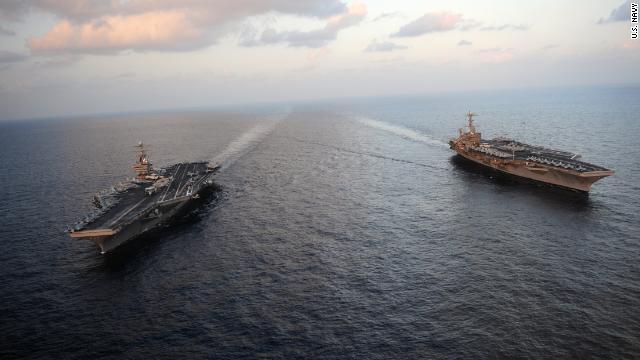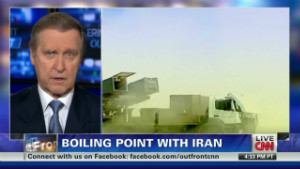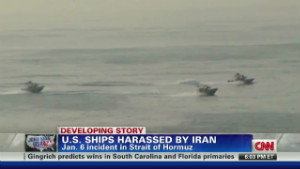January 23, 2012 -- Updated 0245 GMT (1045 HKT)

The USS Abraham Lincoln and the USS John Stennis are in the Gulf. The Lincoln moved through the Strait of Hormuz Sunday.
STORY HIGHLIGHTS
- The USS Abraham Lincoln heads into the Persian Gulf, the U.S. Navy says
- British and French ships accompany the U.S. carrier group, Britain's military says
- Iran had threatened to shut down the Strait of Hormuz
- The U.S. defense secretary says the U.S. will continue to have a presence in the Gulf
The U.S. Naval Forces Central Command said in a statement that the Lincoln "completed a regular and routine transit of the strait ... to conduct maritime security operations." The Lincoln is in the region with the USS Carl Vinson, giving the U.S. Navy its standard two-carrier presence there.
A British defense ministry spokesman, who was not named per policy, said Sunday that the "HMS Argyll and a French vessel joined a U.S. carrier group" going through the strait "to underline the unwavering international commitment to maintaining rights of passage under international law."
"Britain maintains a constant presence in the region as part of our enduring contribution to Gulf security," the spokesman said.
 Cohen: Iran backed itself to a corner
Cohen: Iran backed itself to a corner  Oil prices going up, tensions flare
Oil prices going up, tensions flare  On camera: Iran harasses U.S. ships
On camera: Iran harasses U.S. ships "We have always stated that there is no need for the forces belonging to the countries beyond this region to have a presence in the Persian Gulf," Brig. Gen. Ahmad Vahidi said in early January, according to the semi-official Fars News Agency. "Their presence does nothing but create mayhem, and we never wanted them to be present in the Persian Gulf."
Tehran has threatened to close the Strait of Hormuz, the only outlet to-and-from the Persian Gulf between Iran and the United Arab Emirates and Oman, as it faces increased scrutiny over its nuclear program and possible sanctions on its oil exports. The critical shipping lane had 17 million barrels of oil per day passing through in 2011, according to the U.S. Energy Information Agency.
U.S. Defense Secretary Leon Panetta has responded by threatening to "respond" if Iran attempts to shut down traffic. He said that the U.S. naval and military presence in the region will not change and the current level is sufficient to deal with any situation that could arise.
"We have always maintained a very strong presence in that region," Panetta said earlier this month. "We have a Navy fleet located there. We have a military presence in that region. And ... we have continually maintained a strong presence in the region to make very clear that we were going to do everything possible to help secure the peace in that part of the world."

No comments:
Post a Comment